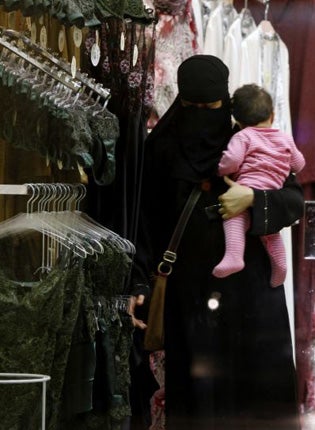Ten Saudis seek asylum after princess is allowed to stay
Chairman of home affairs committee welcomes decision to give sanctuary to woman with illegitimate child

Ministers are considering asylum applications for 10 Saudi Arabian nationals who claim they are at risk of persecution if they are forced to return to the Middle Eastern kingdom, it emerged last night.
The new cases were made public after The Independent revealed the plight of a Saudi princess who was granted asylum in Britain after she had an illegitimate child with a British man.
The young woman, who has also been granted anonymity by the courts, won her claim for asylum after she told a court that she faced execution if her husband found out about her adultery and she was forced to return to Saudi Arabia.
Immigration and asylum experts said last night that asylum cases from women fleeing the kingdom were very rare. But Keith Vaz, chairman of the Commons Home Affairs Select Committee, said of the case: "This is the kind of person that our asylum laws are designed to protect. A woman and her unborn child should under no circumstances be sent back to a country where it is likely that they will be harmed. I welcome the decision made in this case."
New figures released by the Home Office also showed that a further 15 Saudis were refused asylum by the Government last year. There are no details about the sex of each of the applicants nor for the number of asylum applications received this year.
Mr Vaz called for more information to be made public about claims from Saudi Arabia. He said: "This is a country with a questionable human rights record. It is important to make clear the number of people who are fleeing similar treatment."
The princess's case is one of a small number of claims for asylum brought by citizens of Saudi Arabia which are not openly acknowledged by either government. British diplomats believe that to do so would in effect highlight the persecution of women in Saudi Arabia, which would be viewed as open criticism of the House of Saud and lead to embarrassing publicity for both governments.
The woman, who comes from a very wealthy Saudi family, says she met her English boyfriend – who is not a Muslim – during a visit to London. They struck up a relationship after he gave her his telephone number in a department store. She became pregnant the following year and worried that her elderly husband – a member of the royal family of Saudi Arabia – had become suspicious of her behaviour, she persuaded him to let her visit the UK again to give birth in secret. She feared for her life if she returned to Saudi Arabia.
She persuaded the court that if she returned to the kingdom she would be subject to capital punishment under Sharia law – specifically flogging and stoning to death. She was also worried about the possibility of an honour killing. Since she fled Saudi Arabia, her family and her husband's family have broken off contact with her.
The woman has been granted permanent leave to remain in the UK after the Immigration and Asylum Tribunal allowed her appeal. Keith Best, of the Immigration Advisory Service, said that Saudi nationals who were in genuine fear of persecution had the right to claim asylum in the United Kingdom. He explained: "They may also be able to claim if they were subjected to degrading and inhumane treatment. I can see why these cases can be difficult for Britain when one considers the relationship with the Saudi royal family and the many military contracts."
One case already refused by the Home Office is that of Yahya Al Faifi who claims he was persecuted in Saudi Arabia for conducting trade union activities, where trade unions are illegal. He and his family fled to the UK before 2006. In 2004, Al Faifi organised a trade union in BAE Systems after the company announced it was cutting pay by 40 per cent. More than 500 workers turned up to the first union meeting. But Mr Al Faifi and two others were sacked by BAE Systems. For several months afterwards Mr Yahya, whose case has been taken up by the RMT in the UK, continued to campaign for workers' rights leading to his case being given considerable media coverage.
However, when he refused to give up, he received repeated threats and was told that if he didn't leave the country immediately "the safety of his family could not be guaranteed". He left Saudi Arabia with his family to seek sanctuary in the UK. But after his case was refused he now faces deportation.
Saudi women: Victims of oppression
*Women are not allowed to drive or ride bicycles on public roads in large cities. But they are allowed to fly aircraft, though they must be chauffeured to the airport.
In September last year, women's rights activists petitioned the King to allow women to drive all vehicles. There were also calls for Saudi Arabian women to be allowed to compete in international sporting events along with their male counterparts. According to Amnesty International discrimination has fuelled violence against women, with foreign domestic workers particularly at risk of abuses such as beatings, rape and even murder, and non-payment of wages. Concerns have been raised that discriminatory laws relating to marriage mean women are trapped in violent and abusive relationships from which they have no legal recourse.
Join our commenting forum
Join thought-provoking conversations, follow other Independent readers and see their replies
Comments
Bookmark popover
Removed from bookmarks